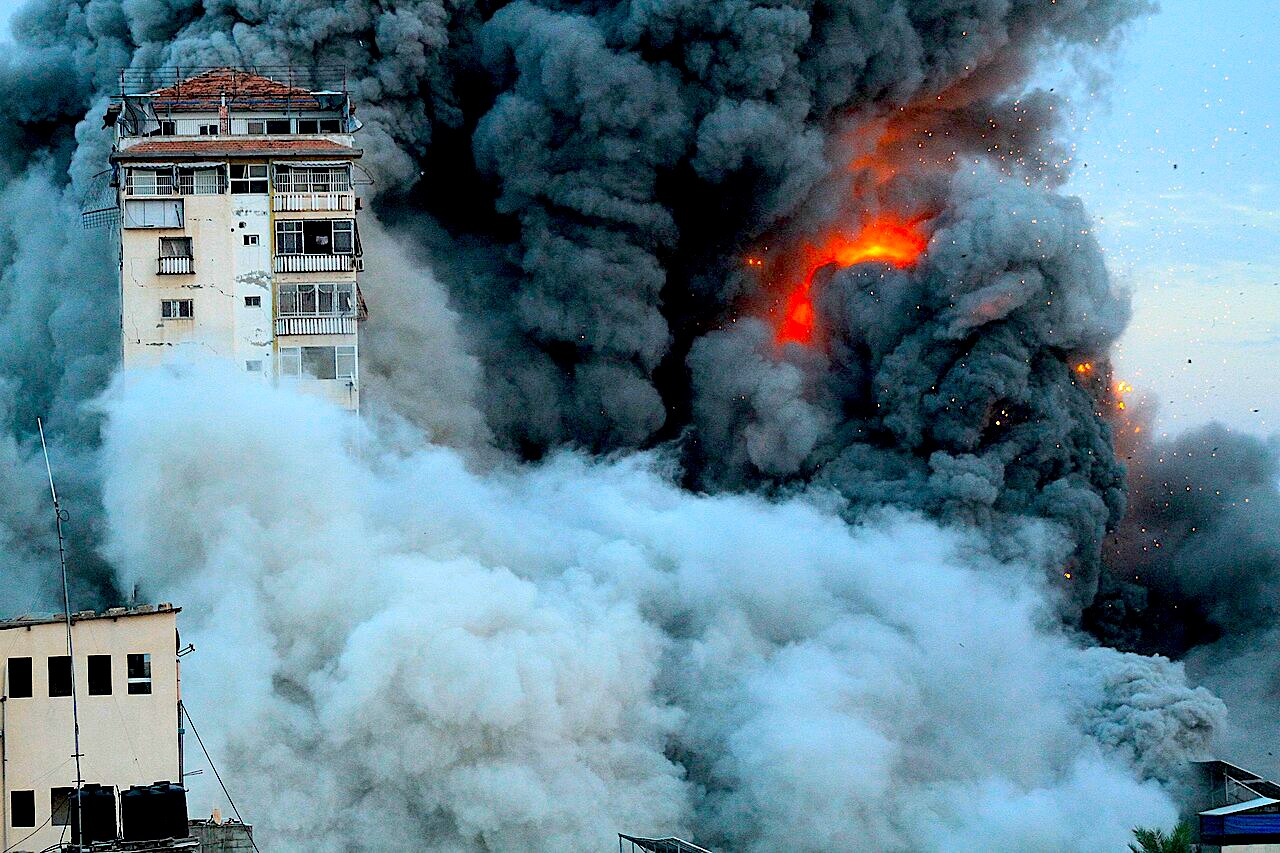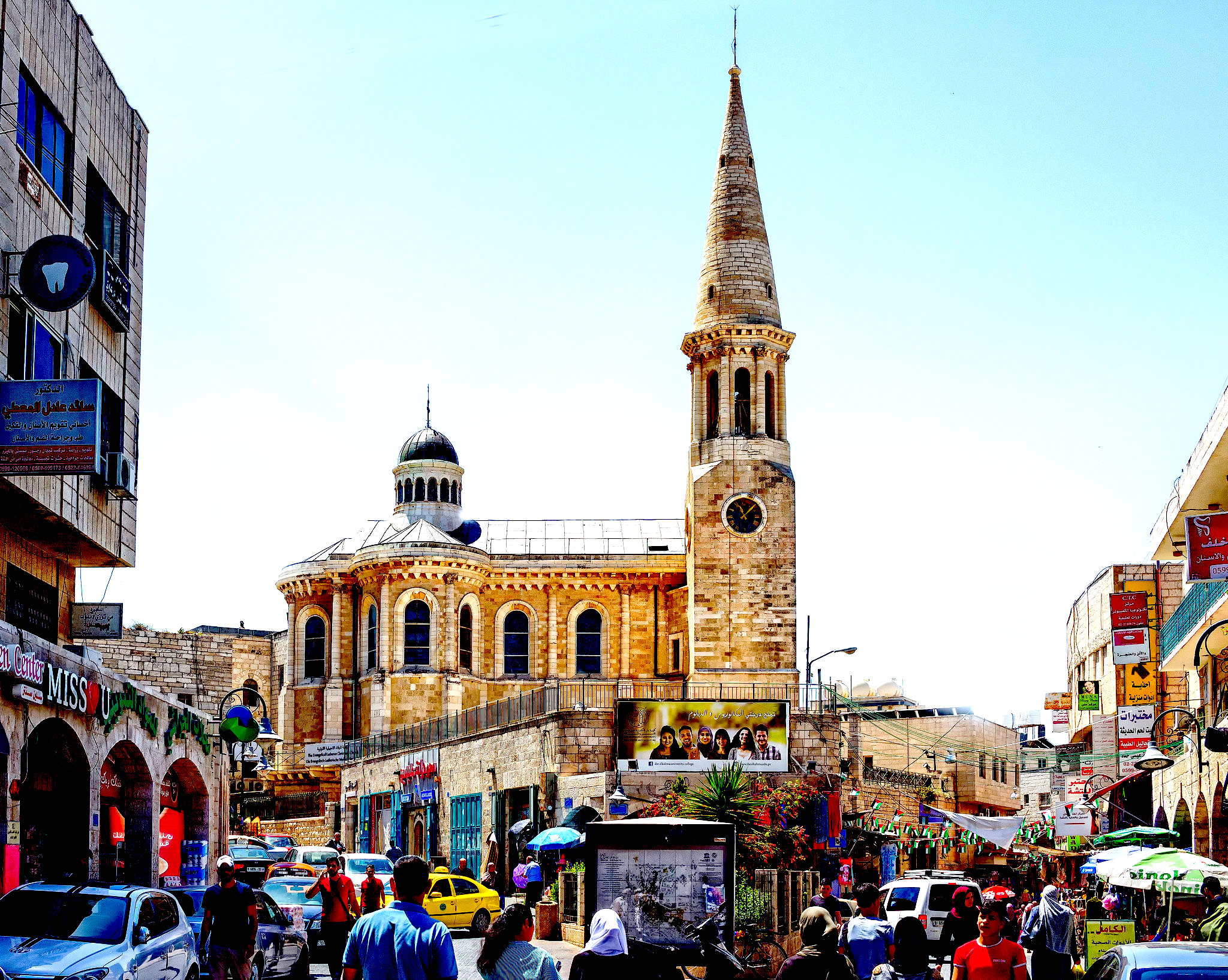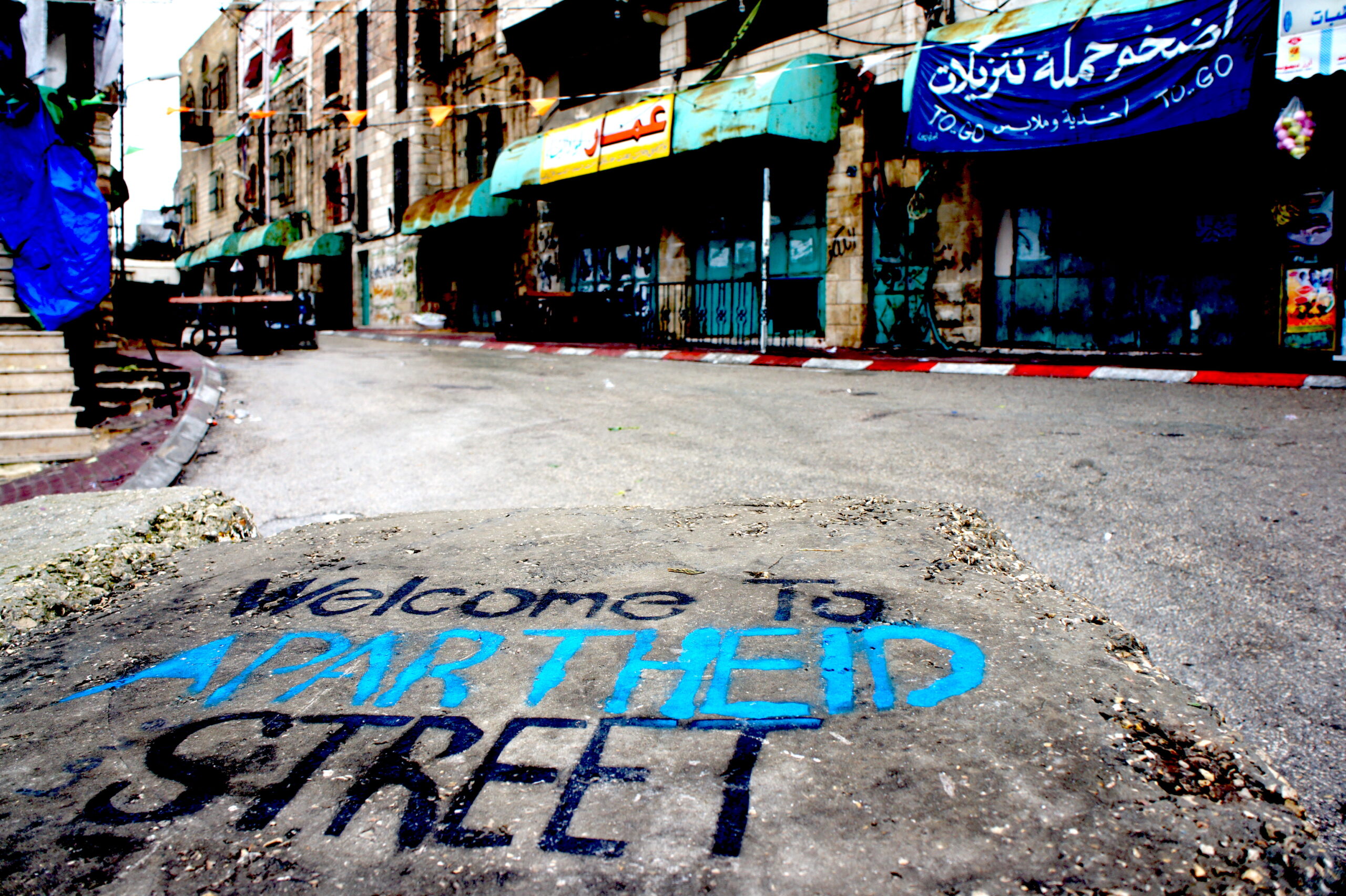Rev. Munther Isaac’s Christmas Liturgy of Lament in Bethlehem dishes out a searing critique of Western hypocrisy amid genocide in Gaza, writes Mick Hall.

Rev. Munther Isaac addresses the faithful at the Evangelical Lutheran Christmas Church in Bethlehem. (Evangelical Lutheran Christmas Church)
By Mick Hall
Mick Hall In Context
 Reverend Munther Isaac’s “Christ in the Rubble” sermon at the Evangelical Lutheran Christmas Church in Bethlehem was as authentic a gospel message as you will come across.
Reverend Munther Isaac’s “Christ in the Rubble” sermon at the Evangelical Lutheran Christmas Church in Bethlehem was as authentic a gospel message as you will come across.
During his Liturgy of Lament on Dec. 23, the Palestinian theologian condemned the world’s indifference to the genocide taking place in Gaza and those complicit in it.
In particular, he called out what he termed the “church of empire,” as well as Western leaders’ hypocrisy over human rights and democracy and did so profoundly, in the direst of circumstances, at the most pertinent of times and places.
As Christians in the West celebrated Christmas festivities, Israel stepped up its industrial scale killing of Gazans 45 miles from the birthplace of Jesus Christ, in a land where Christ also lived under occupation.
At least 20,000 Palestinians, mostly women and children, have been killed so far under conditions of siege as the Israeli army follows its Dahiya doctrine of targeting civilians in a campaign of widespread destruction with the help of an AI program obscenely called The Gospel.
Approximately 1.9 million Gazans have been displaced, forced close to the Egyptian border as Israel creates a catastrophic situation the logic of which dictates Palestinians be cast into the Sinai desert for the U.N. to deal with.
The West’s political classes have been well aware of this ethnic-cleansing endgame since the Hamas attack on Israeli settlements and military bases on Oct. 7. A leaked Israeli policy paper outlined options on what to do with displaced Gazans.
In his address to the faithful, Rev. Isaac accused Western leaders of giving a diplomatic pass for the mass killings, continuing to watch it play out while falsely claiming it a war against Hamas in defence of statehood.

Israeli forces striking Gaza City on Oct. 7. (Ali Hamad of APA images for WAFA, Wikimedia Commons, CC BY-SA 3.0)
“Not only did they make sure to pay the bill in advance, they veiled the truth and context, providing political cover,” he said.
Having their authority bound up in the temporal power of Western states, religious denominations took refuge in meaningless platitudes and empty words of empathy, with little in the way of action to confront the U.S.-led “rules-based” international order and stop the Gaza onslaught.
Please Make Your Tax-Deductible DONATION Today
In allowing Israel’s genocide, the West and its “churches of empire” have decisively embraced an era reminiscent of The Dark Ages, a time of political and moral decay, which Rev. Isaac, as well as many secular observers, say they will not recover from.

Evangelical Christmas Lutheran Church in Bethlehem in 2020. (Ray in Manila, Flickr, CC BY 2.0)
“Even our kinship in Christ didn’t save us. The hypocrisy and racism of the Western world is transparent and appalling,” he said.
“To our European friends, I never ever want to hear you lecture us in human rights or international law again and I mean this… Gaza today has become the moral compass of the world. Gaza was hell before October 7 and the world was silent. Should we be surprised by their silence now?
If you are not appalled by what is happening in Gaza, if you are not shaken to your core there is something wrong with your humanity. And if we as Christians are not outraged by the genocide, by the weaponisation of the Bible to justify it, there is something wrong with our Christian witness and we are compromising the credibility of our gospel message.
If you fail to call this a genocide it is on you. It is a sin and a darkness you willingly embrace. Some have not even called for a ceasefire… For those who are complicit, I feel sorry for you. You will you never recover from this this. Your charity and words of shock after the genocide won’t make a difference. We will not accept your apology after the genocide. What has been done has been done.”
Theological Justification for Status Quo

Al-Shuhada Street, Old City of Hebron, 2012. (Hebronite999, Wikimedia Commons, CC0)
Rev. Isaac pointed to a “state theology” at play in the West, which he said South Africans under apartheid had “defined as the theological justification of the status quo with its racism, capitalism and totalitarianism.”
University of Otago’s Professor of Theology and Public Issues, David Tombs, told In Context Rev. Isaacs was referencing the Kairos document, written in 1985.
“It powerfully exposed the ways that state theology legitimised and even sanctified state violence,” he said.
“Regarding church theology it offered a devastating critique of church theology that presented itself as a moral alternative that exhorted peace but failed to address the reality of the situation through clear-sighted social analysis.
I do think that what is happening – and the critique offered by Rev. Munther Isaac – demonstrates the need for theology that does not rely on easy platitudes, but which is willing to embrace historical and social analysis and then speak honestly and with courage in light of the Bible.
The Kairos document calls this ‘prophetic theology’ and it is embedded in the Hebrew Bible as well as the New Testament.”
Rev Isaac’s own theology is grounded in a tradition that can be traced from the 1960s, loosely called liberation theology.
“I do think liberation theology has much to offer for thinking about how churches and church leaders might appropriately respond,” Tombs said.
Rev. Dr. Munther Isaac criticises global inaction on Gaza at Bethlehem's Evangelical Lutheran Christmas Church.
He highlights the loss of over 9,000 children and 1.9 million displaced Palestinians, condemning Western hypocrisy and church complicity. pic.twitter.com/LoSp3VuLtg
— Middle East Eye (@MiddleEastEye) December 24, 2023
Liberation Theology — a Christian Response to Gaza
After the 1968 Medellin Conference in Colombia called to implement the Second Vatican Council within the context of Latin America, Catholic priests and laity went out into the world in service of people struggling to win self-determination and social justice within a system of neo-colonialism imposed by Western nations after World War II.
Religious base communities were established, where clergy accompanied the faithful in their economic and personal struggles. The movement spread worldwide.
Liberation theology focused on not only freeing people from personal sin, but also from the “structural sin” of empire, capitalism and any system that instrumentalised and exploited people, imposing poverty and suffering, which was seen as a grave affront to both God and human dignity.
Its message was a simple and powerful one — God stands unequivocally on the side of the oppressed.
Mick Hall is an independent journalist based in New Zealand. He is a former digital journalist at Radio New Zealand (RNZ) and former Australian Associated Press (AAP) staffer, having also written investigative stories for various newspapers, including The New Zealand Herald.
The views expressed are solely those of the author and may or may not reflect those of Consortium News.
Please DONATE to CN‘S Winter Fund Drive



Liberation theology was something that was opposed and declared heretical by the ultraconservative and reactionary Cardinal Joseph Ratzinger, who would later become Pope Benedict XVI.
I can do no better stating my position on organized religion that J. Anthony did here 12-29-2023 @ 08:13
I will add one observation.
Everyone knows that church monies pull strings in D.C., to say it does is a statement not based in reality. The government stand on tax exemption for churches has opened a “Pandora’s Box “of end around moves, gaining “Undue Access” to congress through the lobbying of congress in a way I do not believe the framers of the Constitution ever intended. The avoidance of tax laws has enabled this. Full Stop. Period!
Deeply Religious individuals, far too many of the most powerful, know no bounds to their silly machinations, as any normally cognitive person, who, after watching any of several “crack pot”, TV evangelists , will attest to.
Anyone my age or younger see and understands wanton greed for what it is, regardless of the justification for such behavior.
Rev. Munther has made the perfect call with respect to the West’s churches of empire. Brilliant!
Be strong everyone!
Thanks CN.
Pastor Munther Isaac’s extraordinary sermon would have reached spiritual perfection had he issued an urgent, relevant correction inside his excellent testimony:
Jesus Christ taught the doctrine “Blessed are the peacemakers”, and NOT “Blessed are the genociders”…
The problem seems to have started with terrorizing temples however and the calling people out based on one supper as killers. Much history has followed that but there appears to not be any real record of the events perhaps invented hundreds of years later. That give rise to suspicion that defamation of character started with an empire attempting to weaponize a stolen religion against itself for purposes of a military occupation by Rome. The occupation of warfare has fared well with monotheism throughout western civilization and now is a treat to human civilization on this tiny planet with resource limitations and excessive profit motives for male dominance behavior regardless of all our saviors.
The name of the church, and the Church to which it belongs, is incorrect/misleading. It was founded by Germans and German-Americans. In German, “evangelisch” simply means “Protestant”, not “evangelical”, so this is simply the Lutheran Church in Bethlehem.
(“Evangelical” is “Evangelikalisch” in German.)
How long before this Pastor becomes a target? The Zionist Nazis don’t seem to respect anything that dares oppose them.
Giving yet another sermon, from Bethlehem at Xmas time certainly grabs the headlines, and more tellingly, the heartstrings, during killing rampages!
However, surely not too many blindly believe that the ‘Church’ itself has not historically been an integral part of “Western” hypocrisy?
Morally decayed AND LOVING IT!
Let’s face it: all those vessels of the past which once held meaning for us are being emptied to fill a present seeking only to nullify that past altogether. That being said, Reverend Isaac’s message is not to be forgotten. The truth of the moment is always viable. What does one do when the landscape itself is being erased, and only the shadows of its former glory raised in its stead? You refuse to accept the meanings being foisted onto you, and accept the declarations of their intentions going forward as the real truth you must face. Read the receipts of actual history and remember those responsible for it, but do not fall for the propaganda being fed to you as a replacement of our own collective reality. Receipts, not beliefs. And the yet the beliefs of this minister describing our present moment are very powerful, and not to be missed. Such a missive as this is a reality.
The very last clause of this timely write-up embracing that highly responsible sermon at Bethelehm should be laser chiseled on the foreheads of all the leaders of every nation complicit in this genocide. They a collective shame on humanity !
For those who actually want to see/hear this speech
hxxps://www.democracynow.org/2023/12/26/christ_in_the_rubble_christmas_sermon
And there is an interview of him as well …
Thank you
This evangelical believer stands with Rev Isaac.
Christianity is the perverse religion which grew out of the evil religion of Hebrewism. Jesus was a good man not a mythical god.His message has rightly resounded down the many centuries and its central core is simple but profound .That of love. Love everyone and everything. Love even your enemy. Trying to follow that advice I don’t hate the Zionists but I feel profoundly sorry for the state that they have sunk to . And even more sorry for their sad victims the Palestinians. The Zionists didn’t invent capitalism but they clung onto it like invisible leeches and circa one hundred and fifty years secretly took over both major centres the U.S and the U.K.
Yes, Jesus did not mince words: “This is my commandment, that you should love one another, as I have loved you. This is the greatest love a man can show, that he should lay down his life for his friends; and you, if you do all that I command you, are my friends.” (John 12-15). How quickly wars and bombings would end if everyone would obey this commandment.
But when your people have been subject to murderous attacks that are on-going love of them is not inconsistent with defending yourself. Only, as Albert Camus observed in relation to outrages during the Algerian war of independence, there are limits to that response. Killing of innocents is a limit.
In the context of Zionism it is important to remember that Jesus was himself a Jew, perhaps the most famous and revered Jew who ever existed. Consciousness of that fact should help prevent opposition to Gazan bombings from being construed as anti-Semitism.
You are absolutely right !
Yes, I think if the Jesus of the NT returned tomorrow, they’d call him an “evil socialist” and crucify him again.
The hypocrisy is not just in the West. Where are the Muslim countries? Israel could not have gotten away with this had the Muslim world taken action. Cut off oil to the West. Muslim countries in the area if they combined could certainly give Israel a bloody nose.
Actually most Muslim countries are saddled and being led by “leaders” and upper classes that are lucratively engaged by neo-liberalism after most of their genuine religious leaderships have been successfully victimized and politico-economically marginalized under the secular dispensations foisted on them in the aftermath of the bloody imperialistic onslaughts of their former colonial powers. Those powers still squeeze their testicles !
Exactly. Which is why US foreign policy in the ME for so long has been to keep the Arab states divided. Destabilize, occupy,control.
The Houthis in Yemen are doing something–it’s a slow but inexorable thing.
Israeli slaughtering of Palestinians begs the question: If Jews are “God’s chosen people”, what “God” are we talking about?
The Devil
In my opinion…THERE IS NO GOD…or is he/she sleeping on the job???
Mot, the God of Death from the Baal mythological cycle
She [Baal’s sister, Anat] seized Death by the edge of his clothes,
she grabbed him by the hem of his garment;
she raised her voice and declared:
“Come, Death, give me my brother!”
And El’s son Death replied:
“What do you want, Maiden Anat?
…
I hungered for human beings,
my appetite for the masses of the Earth.”
Someone once wrote: “How odd of God to choose the Jews.” Someone once replied: “Not half so odd as those who choose
a Jewish God yet spurn the Jews.”
Imagine thinking of the words to say in a sermon in Bethlehem at Christmas with all this ongoing killings and carnage. Rev. Isaac certainly chose all the right words.
My wife and I watched this spectacular sermon on X on Christmas Day night. Extraordinary and trenchant.
Reminded me of the spirit of Oscar Romero.
”Matthew 19:14 New International Version. 14 Jesus said, “Let the little children come to me, and do not hinder them, for the kingdom of heaven belongs to such as these.” Those dead little babies wrapped in their white shrouds were an abomination perpetrated by those killers who knew no mercy. I think we should know by now the nature of the demonic creatures which move among us.
Christianity was perverted when it became a ‘state religion’. I forget who we have to thank for that, whether it was Emperor Caligula or Emperor Nero? A religion for the oppressed, which is what Jesus was obviously teaching, is always going to be the opposite of a state religion.
Its the perversion of state religion that leads to concepts like ‘just war’, the Spanish Inquisition, of being ex-communicated by French priests for thinking that liberty and equality are good ideas, and the American preachers who used to say that slavery was “god’s will” and the ‘natural order’. That’s the state talking, not Jesus. That’s power and money talking, not Jesus. That’s the plantation owner speaking through the preacher’s mouth, but not Jesus.
The last thing any ruler wants is a bunch of people who want to hug their enemies and care for the people around them. Such a path does not lead to power and wealth in the hands of the ruler. Such people won’t serve in the ruler’s armies, and will insist that the ruler’s gold be used to feed starving people. The ruler is never amused by such notions.
True Christianity is always an underground movement. You’ll find true Christianity in the catacombs, but rarely, so rare as to be almost never, in the palace. I am tempted to just say ‘never in the palace’, but absolutes are usually proved wrong. If Christianity wants to ‘free itself from mental slavery’, it is going to have to remember and accept that the rulers and the state will always be in opposition to the Christians.
It was, of course, Emperor Constantine — but it must have been with the collusion of church leaders of the time. Even before then, “Christians” formed violent mobs to attack non-Christians in places like Alexandria, and priests were assaulting one another at synods.
I think it was Constantine.
Well said Cool Hands. I totally agree but would add the rider that gods are creatures of fiction while the love that the man Jesus taught is the basis for total cooperation and total opposition to war.
I agree. I am not religious myself but I have no problem with people believing or practicing whatever they wish, as long as they’re not hurting anyone else. “State theology”, organized religion, these massive financial institutions undercover with faith, are all abysmally hypocritical and should have went out centuries ago. I have much respect for those who who speak out and try and practice in a positive way for our species and the world.
very well said, thank you.